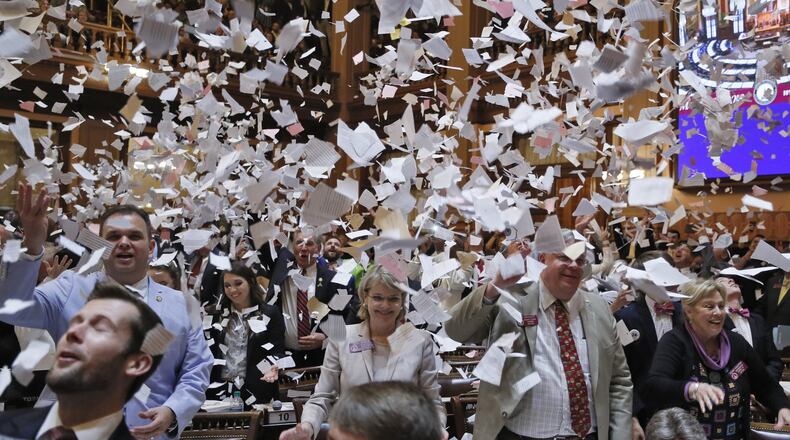As in years past, lobbyists spent hundreds of thousands of dollars on lawmakers during the General Assembly’s legislative session, which concluded its business at the end of March.
Five years ago, lawmakers enacted the first lobbying reforms limiting the gifts they could receive from special interests. The $75 cap reduced total spending, but it's crept up every year since as lobbyists and lawmakers learn the new system.
Here’s are five things to know about lobbyist spending in the 2018 session.
1. Spending went down.
Lobbyists reported spending $483,466 during the first three months of 2018. And while nearly half a million dollars spent over three months of wining and dining lawmakers seems like a lot, it’s an 11 percent decrease in spending from 2017.
Spending during the legislative session used to total about $1 million. This year’s first quarter spending is the first decrease in five years.
2. That decrease you just read about? It’s wrong.
Traditionally, the single most expensive event of the session is a seafood feast thrown by the Savannah Area Chamber of Commerce. Since 2010, the dinner has averaged about $85,000 in reported costs. This year's event was held Feb. 15, but Jared Downs, the chamber's lobbyist, reported no spending at all.
After being contacted by The Atlanta Journal-Constitution, Downs said he would amend his report this week to reflect the spending.
“We’re still waiting for the final numbers to come in,” he said Sunday.
Downs amended his late February report Wednesday to reflect $77,631 cost of the dinner.
Adding in that cost, lobbyist spending for 2018 continued its upward trend, reaching its highest total of the post-reform period.
3. Most of that money is spent on food. But they spend a lot on drinks, too.
If state lawmakers look a little portly as a group, there's a reason. For three months of the year, they eat out a lot.
A query of state lobbying data for the word “dinner” turns up $181,000 in spending (again, without including the Savannah feast). “Lunch” nets another $95,000. Even “breakfast” cost lobbyists $27,000 over the first three months of the year.
Lobbyists also logged $62,000 in generic “meals.” Altogether, including random snacks and coffees, the $364,421 in food accounts for 75 percent of all lobbyists’ reported spending. That’s a lot to digest.
If you query the database for “drinks,” you find just three instances where a lobbyist copped to buying a cocktail for a lawmaker. The total is just $46.53. But if you add the code word “hospitality” to the mix, you get a more robust $7,641.
A small group of lobbyists representing the beer and liquor wholesalers, among other interests, contribute to an open-bar “hospitality suite” in a condo near the Capitol, which they restock with regularity throughout the session.
4. The top spenders: Sodas, cities, bankers and barristers.
The lobbyist for the Georgia Beverage Association, which represents the soft drink industry in the state, was the legislative session’s top reporting spender (again, the Savannah Chamber hasn’t reported yet). Kevin Perry, GeorgiaBev’s Capitol man, spent just under $15,000. Much of that went to big complimentary lunch buffets for all lawmakers during the session, but it also included almost $1,200 in free tumblers and pallets of free soft drinks delivered to Capitol offices.
Second on the list is Brad Carver, a lawyer and chief lobbyist at the Atlanta firm Hall Booth Smith, who recorded $11,448 in spending. Smith represents energy sector clients like SCANA Energy and RaceTrac gas stations, but he also reps would-be cities like Vista Grove and Greenhaven.
Lobbyists for the state bankers ($11,099), trial lawyers ($10,862) and electric membership corporations ($8,996) round out the top five spenders.
5. A Republican chairman and a Macon Democrat top the individual list. But the real money is in groups.
The top individual recipient of lobbyist gifts was House Small Business Development Committee chairman Sam Watson, R-Moultrie, who took a reported $2,087 in reported gifts. Most of that went to dinners with lobbyists, but there were other goodies, including $250 in "ag products" from a tobacco lobbyists.
Right behind, Watson was Rep. James Beverly, D-Macon, who took in $1,882 in gifts.
With the pressure to keep under the cap a real concern to most, lobbyists flock to group dinners. The Senate Rules Committee, which controls the flow of legislation in the chamber, logged more than $13,300 in group dinners. Lobbyists sponsored the Senate Republican Caucus, which holds the majority in the chamber, for just under $30,000 in meals. Senate Democrats got just $4,622 in group dinners, but in fairness they are a much smaller group to feed.
About the Author
Keep Reading
The Latest
Featured




